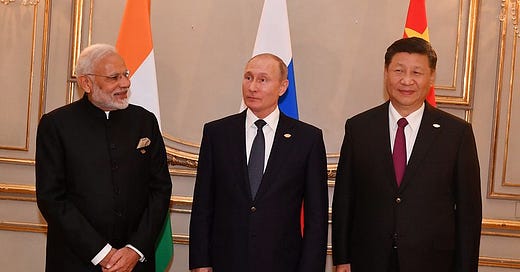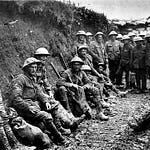Rob’s comments are in italics.
Derek’s comments are in normal font.
We're going to take a swipe at current events, current goings on, because as usual, things are running apace. We're also going to touch on inflation, which is coming back into the realm of relevance. Where do we need to start?
Okay, I think we've had things running at a pace on numerous geopolitical fronts. It's been more of the same. America is now saying they're pulling out of attempting to broker a deal for peace in Ukraine. It was a bit of a thin claim in the first place considering the responsibility America had for provoking the situation. It did seem initially that progress was being made. It's now stalled. Trump seems to be getting more unpredictable. From the word go, everybody said the one predictable thing about him was that he was totally unpredictable.
Yeah, crocodile tears.
The picture emerging is that what he says appears to be whatever thought has flitted across his brain, determined by whoever he spoke to in the last five or ten minutes. It's also pretty clear that there are people in the team he's assembled who are clearly pulling in very different directions. JD Vance has made comments about the fact that it's now down to Ukraine and Russia to talk to one another and sort something out.
General Kellogg still seems to be in the picture despite all his contributions to diplomacy appearing completely out of step with anything else in the American administration. He's talking about having a demilitarised zone between the two parties policed by European forces. Russia isn't going to agree to that for one moment. He's also suggested conceding Crimea to them and possibly the other occupied areas in Ukraine to Russia. Zelensky has said flat out that he's not going to accommodate that.
What else have we had? Putin has said he was offering a 72-hour ceasefire over the course of the victory celebrations, 8th to the 11th of this month, which are currently going on. Ukraine appeared not to be engaging with that offer at all on their side. They've done things which seem flagrantly reckless, particularly launching an enormous wave of drone attacks towards Moscow. As far as I can tell, virtually all these have been shot down without causing significant damage in Moscow.
There was a pretty explicit threat to attack the victory parade, considering heads of states from over 100 other countries, including powerful ones like China, were attending. That would be an act of complete recklessness. The parade has gone off successfully without incident, which is a huge relief.
It's also interesting that the Russians refer to the Second World War as the Great Patriotic War. They point out they lost over 27 million citizens in the Second World War, a far higher death toll than any other country. They also did more to overrun the Nazi war machine than any other combatant. Putin made a forthright speech about that today at the victory celebrations.
The speech is worth listening to because he said something along the lines of, it was nice that our allies opened a Western front to divide the task of conquering the German army. Of course, the US, Britain and Western allies regard the D-Day effort and invasion through France into Germany by predominantly American and British troops as the decisive act. We think of Russia's participation being a useful contribution. The verdict of history will be that it's the other way around.
The fact that the majority of world leaders have come to Moscow for this parade speaks volumes about the perception of Russia by the rest of the world. Whether they perceive that as an expression of righteousness or simply a realistic assessment of where power is flowing, it's certainly a statement. The reaction of European leaders to refuse to participate in that celebration seems utterly petty minded to me.
There have been strong statements that Russia and China are very much singing from the same hymn sheet. They're supporting each other and working towards a more collaborative world. Xi Jinping is spending a full four days on a state visit to Russia to tie up many details again. It speaks volumes.
China and Russia are becoming more closely allied in response to the actions the United States is taking and the actions Western allies in general are taking. They're clearly supportive of many other countries who've been the victims of European and North Atlantic imperialism. The tide is definitely flowing faster.
Against that background, various sources are questioning whether there really are the gold reserves in the American treasury that it claims to have. People are asking whether there is anything in Fort Knox. Even if there were the 150 million ounces of gold supposed to be there, without a full audit of the bookkeeping, you wouldn't know whether they actually have title to it or whether it's been sold or pledged to other countries.
This is quite extraordinary. At the end of the Second World War, when they set up the Bretton Woods financial institutions and tied all currencies at fixed exchange rates to the dollar and tied the dollar to gold at $35 an ounce, the theory was that Fort Knox would be audited every year. It's actually been audited a couple of times in the 1950s but hasn't had a full audit since then. There was a when this conversation,
Sounds like a house of cards, doesn't it?
surfaced a decade or two ago. They did what was basically a publicity stunt of taking a bunch of congressmen and women to Fort Knox and showing them around. They took them down to the vaults floor, unlocked one of the vaults and showed them a lot of big piles of gold. They all went away saying they were thoroughly satisfied. It was pointed out that room would have held maybe a million ounces of gold. There's supposed to be 150 million altogether so that might have been all there was for all anybody knows.
Even if the full content were there, it wouldn't actually guarantee that it still belongs to the United States Treasury. That's one of the things. Another thing I find very interesting is that partly prompted by one of the promises Trump made, which he has partly delivered on, was to have full transparency about various issues that have been the subject of so-called conspiracy theories. It's ridiculous that the term conspiracy theory is used. in a
Especially by people who are conspiring with each other to impoverish the rest of us!
The point is that a conspiracy is simply a secret arrangement between a group of people to commit a crime. This happens all the time. Almost every crime involves more than one person except maybe pickpocketing.
Every crime that's committed is arguably the result of a conspiracy. So conspiracies happen and if somebody alleges that a certain thing is a responsible conspiracy, that's not saying very much. It certainly doesn't presuppose that it's fantasy. The question is, is this a genuine conspiracy or a made up one.
Yeah, there's some good ones and some not good ones, just like anything in life. The time between conspiracy theory and conspiracy fact seems to be shortening.
I think many people are interested in different things. Some are interested in the JFK assassination, some in the Robert Kennedy Senior assassination, some in the Epstein assassination, sex rings, some in various other things that have gone on in the past. Because there's now much more discussion, many people are realising there's all this other stuff going on which is pretty suspicious.
Getting back to immediate present events, we've had a pretty scary flare-up of conflict between India and Pakistan. Neither appear to be run by cool-headed, rational individuals, both are nuclear armed. There are definitely alarming potentialities there.
I think that's probably the end of course. We've got the Houthis striking out at Israel. Most airlines have pulled out of flights there for the time being following the attack on Ben Gurion Airport in Tel Aviv, which apparently made a 25-foot crater but didn't do any terminal damage to the functioning of the airport. The political and psychological fallout is that air travel to Israel has been pretty much suspended.
Trump claims the Houthis have capitulated in response to the bombings. They've said they won't attack any more ships, possibly apart from Israeli ones, in the Red Sea. Trump's trying to spin this as a victory, but they're going to continue attacking Israel. We don't know whether there's going to be an attempt to get into a war with Iran. If there were, that would plainly be disastrous.
Okay, so that's where we stand with the state of the world at the moment.
Inflation
What did we have to say about inflation? I noticed when I opened the tin of beans for the kids last night that the amount of sauce in the beans seems to have increased recently relative to the amount of beans. I wonder if that was your observation.
I haven't opened tins of beans lately, but I could well imagine that's the case. I certainly noticed there were far fewer oatcakes in the last packet I opened. I noticed that many packs of tea and coffee that had been 250 grams were now 200 grams. So even when there haven't been explicit price rises, there have been sneaky ones.
I'm going to have to do a real analysis. The most useful analysis would be to look at the prices of various things, not in terms of money figures, these are almost inconsiderable. I'm thinking about across the course of my lifetime.
In the 1950s, prices were really stable, but it became apparent to me that things were typically three times as expensive as the prices had been apparently before the war. Then chocolate started getting smaller, packets of biscuits started getting smaller, but it was essentially on a fairly modest scale. When you look at it over the course of 60 years, which probably to young people seems like a long time span, after you've lived through it, it doesn't seem so long somehow.
We know it's understandable that between the beginning of a war and the end of a war, money should be worth a lot less. After all, there've been many resources wasted in the war. There's been a lot of expenditure of money that was essentially being borrowed from the future to conduct the war. That's the more or less inevitable result of it.
Considering we haven't been at least directly at war over that 60-year period, it's quite astounding. You have to look at it in big picture terms to get the whole scope of it. It was the norm in the 1950s and 1960s that one wage earner in a family was enough to provide housing, food, clothing, utility bills for an entire family. Whenever there was a second partner of a marriage also working, it was a matter of choice. It was a matter of them wanting a higher lifestyle. Now, for most people, it isn't a choice at all. To cover the outgoings of a family, it takes two people working flat out.
Let alone to keep up with the Joneses, to go on the holidays, to do all the things that everyone else seems to be doing. I'm not too pressured about these things, but many people are. Yeah, it's expensive.
Yeah. I was thinking that even before you get to that, you're just paying your bills and getting a roof over your head. The mere fact that for many people, the prospect of owning their own property is becoming less of a realistic objective.
Yeah, I think often now people inherit money and that then forms a deposit that gives them the lump sum. You're still in a situation where you rent it from the bank on a variable rate mortgage. You still pay a tremendous amount of interest on that.
The implications of the collapse of the dollar system are going to result in a very steep decline in what Americans and people like Britain and Europe, whose economies are really pretty tightly yoked to the American financial system, are going to see the value of that continue to go down.
We might all be on the tins of beans for a while!
Yeah. So watch this space.














Share this post